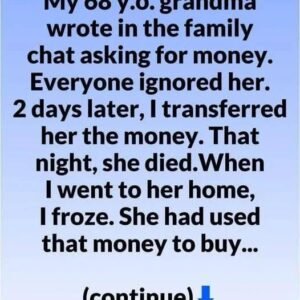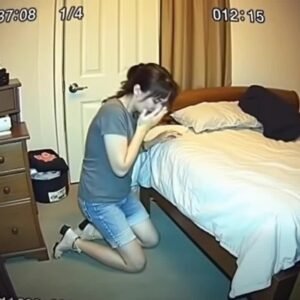At the memorial, I didn’t say a word. I just stood there, my suit too tight, my jaw locked so hard I thought my teeth would crack. That’s when Pastor Pierce walked up, a big man with gentle eyes, and shook my hand like I was a man, not a cautionary tale whispered about in the pews. He looked me in the eye, his gaze steady and unwavering, and said, “Don’t turn to the right or to the left.” I nearly laughed in his face. I didn’t need churchy riddles. I needed my family back. But he stuck around. He didn’t flinch when I ignored him. He didn’t back off when I barked at him to leave me alone. He just said it again, like a mechanic giving the same solid advice twice. “Keep walking, Harlon. Don’t turn.”
I started going to his Tuesday night support group a week later. I didn’t talk, didn’t pray. I just sat in the back of the stuffy church basement, drank burnt coffee, and stared at the stained carpet. Pierce never pushed. He just nodded when I showed up and clapped me on the shoulder when I left. Half the reason I kept going was him. The other half was Maren, Tessa’s younger sister. She was at every group meeting, checking in afterward, leaving Tupperware containers of lasagna on my porch, calling just enough to be annoying, but not so much that I snapped. She worked at the county school office as a custody coordinator, dealing with messy families for a living. She knew when to shut up and let people sink or swim on their own.
Nights were the worst. Just me, a fridge that hummed too loud, and baseboard heat that clicked like a metronome counting out the seconds of my grief. I kept two things on the shelf by the door: Tessa’s old wooden recipe box and our boy’s little blue toy truck. That’s it. Everything else could rot.
Pierce started me off with simple things. Breathing exercises, journaling, some first-aid refreshers I’d learned years ago on the job. “Small wins beat big speeches,” he said. That one stuck better than the Bible verses. Daryl, my shift supervisor, didn’t fire me, even though I missed a full week of work after the fire. He kept me on the overnight dock. “You’re steady,” he’d said. I wasn’t. But I said thanks anyway and made sure I showed up, even when grief felt like a physical blow that knocked the wind out of my ribs.
The first Sunday in March, I decided to show up at church, sit in the back, and count how many times Pierce said the word ‘hope.’ I made it to seven before he hit me with Deuteronomy, his voice sharp, his eyes locked forward. “Do not turn to the right or to the left.” After the service, he caught me in the aisle. “Keep walking, Harlon,” he said, clapped my shoulder once, and left me standing there like I’d swallowed a nail.
I took the back road home, the same one I always took, down under the state bridge, where the creek runs low and the rocks shimmer like foil in the afternoon light. That’s when I saw it. Hazard lights blinking up ahead. A beat-up sedan stopped crooked on the shoulder. Some guy hopped out, gray hoodie, dark jeans, carrying a wooden crate in both arms like he was running late for something bad. He walked straight to the guardrail and chucked it over, like it was a bag of trash.
Before my brain even caught up, my body slammed the brakes. I was out the door, kicking off my boots, and scrambling down the embankment without a second thought. That’s the exact second my life broke open all over again.
I hauled the crate to shore, my hands tearing at the lid, splinters digging into my fingers. Inside, a newborn, blue-lipped and terrifyingly quiet, but breathing. The world narrowed to that tiny, rising and falling chest. I called 911, my voice raw and shaky, and told the dispatch what I’d seen. They patched me through to the hospital’s on-call child welfare investigator, a woman named Blair, who told me to drive straight to Urgent Peds and follow her sedan in.
I followed Blair’s tail lights through town, white-knuckling the steering wheel like it might break free. The baby was tucked inside my flannel shirt, his cheek against my chest, his breath warm but shallow. Every bump in the road made me flinch. I kept one hand on the wheel, the other cupped around his small back, as if I could hold him together with body heat alone.
The Urgent Peds entrance lit up the side of the building like a gas station—harsh, buzzing, too bright. Blair didn’t wait. She flagged down a nurse who opened my car door and reached in with a practiced calm, as if men with soaking wet shirts and stolen babies showed up every day. The nurse’s fingers moved quickly, checking his pulse, her eyes scanning. “Follow me in,” she said. “We’ll get you both warm.”
Inside, a team of nurses moved with swift efficiency. A woman in purple scrubs took him from my chest, wrapped him in fresh blankets, and disappeared behind a set of double doors. I stood there, soaked to the thighs, my shirt half-open, my heart pounding like I’d just survived a wreck. One nurse handed me a dry towel and pointed toward a chair. “Sit,” she commanded. “You look like you’re going to pass out.”
“I’m fine,” I muttered, but my legs disagreed. I sat.
Blair came back with a clipboard. “We’ll need an initial account from you. Just the facts for now.”
I nodded and gave her everything: where I was, what I saw, how I reacted. She wrote fast but didn’t interrupt. When I finished, she looked up and said, “We’ll do the intake under John Doe for now, but if he makes it through the night, he’ll need a name.”
That hit harder than I expected. I looked down at my shirt, still clinging to my arms, wet with river water.
“We don’t know his name. We don’t know anything,” she said, her voice softening slightly. The nurse reappeared. “He’s stable,” she announced. “Vitals are holding. No obvious injuries. Doc thinks he’s less than a day old.”
I leaned forward, elbows on my knees, and let the air out of my lungs. One full breath. Just one.
Blair touched my shoulder. “I’m going to call the child welfare line and report the safe surrender. It’s technically an abandonment, but he’s alive. That matters most right now.”
A few minutes later, I was allowed back into the pediatric room. The baby was in a bassinet under a warmer, wrapped like a burrito. His skin had more color now, like milk and peaches. A tiny, sharp chin, his lips moving in his sleep like he was dreaming already. I reached in and touched his hand. He gripped my finger with a surprising strength, a tight, stubborn reflex, like he wasn’t letting go.
The nurse smiled. “That’s a good sign.”
“Hey, bud,” I said. The word caught in my throat like a fish hook. I stepped back before I lost it completely.
Blair came in behind me. “This is going to move fast. CPS is opening a file now. Until we identify next of kin, we’re going to need a temporary caregiver.”
“Foster?” I asked.
“Short-term. Just a safe place until we know who he belongs to. Could be hours, could be days.” Before I could answer, my phone buzzed. It was Maren. I stepped into the hall and picked up.
“He’s okay,” I said before she could speak. “They’ve got him on monitors and heaters and whatever else.”
“What do you need?” she asked, her voice all business.
“I don’t know. I’m at Pierce’s still. Want me to meet you there when you’re done?”
I paused, the thought of facing my empty apartment with this new, fragile life feeling impossible. “Yeah. Yeah, that’s good.”
Back in the room, Blair said, “We’ll transfer him to county care once we’ve got a spot. For now, if you’re willing, I’d rather not separate him twice in one night.”
“What does that mean?” I asked, my head spinning.
“It means you take him home tonight. Paperwork in the morning. We’ll set up temporary care then.”
“I’m not… I don’t have diapers. I don’t have formula. I don’t even know what he eats.”
“He doesn’t eat. He drinks every two hours and screams when he doesn’t. I’ll send supplies.”
I stared at the little bundle in the bassinet, one socked foot sticking out. The barrette they’d removed from his umbilical cord was sitting in a plastic evidence bag on the counter—a cheap pink clip with a tiny white daisy on it.
“Okay,” I said, the word leaving my mouth before I had a chance to stop it. “I’ll take him tonight.”
Blair handed me a form. “Sign here, here, and here. We’ll file the rest in the morning. What do we call him?”
I thought about the box, the bridge, the way he cried out the moment I reached in. Luke came to mind. Straight out of Luke 15: lost and found. “Luke,” I said.
She wrote it down without comment. “Luke, it is.”
They wheeled us out to my truck twenty minutes later. The nurse showed me how to buckle the infant seat they’d loaned me, double-checking every latch like a flight crew preparing for takeoff. Luke stayed quiet until we hit the harsh floodlights of the parking lot. Then he wailed, a raw, terrified sound, as if he remembered where he came from.
“We’re not going back there, bud,” I whispered, and he settled.
I drove straight to the church parking lot. Maren slid into the front passenger seat with her coat off and her hands ready. She didn’t say a word, just took Luke from my arms and held him close, her movements sure and steady. “He’s tiny,” she said, her voice soft, “but alert.”
Pierce came out with a fleece blanket and a look that made me feel like I hadn’t completely lost my mind. He placed a hand on my shoulder and said, “You’re not alone in this, Harlon.” I wanted to believe him, but it still felt like I was free-falling through empty air.
Twelve minutes later, headlights pulled in. Blair stepped out, holding her clipboard like a sword. She checked Luke’s vitals again, asked a hundred questions about my house, my job, my food, my heat, my emergency contacts. Then she said, “Follow me home. We’ll drop off supplies and prep your space.”
I nodded. I didn’t think. I didn’t plan. I just drove behind her, a different man than the one who had gone under a bridge just an hour ago. That much was already true.
The next day, at the formal intake, a no-nonsense doctor confirmed Luke was born within the last twenty-four hours, had no prenatal care, and was suffering from cold stress but would likely bounce back. It was clear someone had hidden the pregnancy. Blair stood in the doorway, her arms crossed, that familiar look on her face as she lined up the facts in her head.
“If you’re willing,” she said to me, “I’d like to list you as a temporary caregiver. Emergency placement, kinship-like.”
“Kinship-like?” I blinked.
She flipped a folder open. “You’re not blood, but you found him. You have ties to his… situation. It lets us keep him out of shelter care while we figure out the next steps.”
“Yes,” I said, my mouth moving before my brain caught up. “I’ll take him.”
Blair didn’t smile, just handed me a form and clicked her pen. “Initial term is seventy-two hours. After that, we reassess.”
That’s when a man in a rumpled sport coat stepped into the room, flashing a badge that had seen better days. “Detective Doyle. You the guy who found the baby?” he asked, his eyes tired but sharp.
I gave him everything I had: the make of the sedan, the gray hoodie, the way the guy moved fast and nervous. It wasn’t much.
“The box?” Doyle asked.
“Wooden. Looked handmade. Heavy enough to float low in the water.”
“You touched it?”
“Yeah. Pulled it in, opened it. I had to.” He didn’t argue, just pulled out a swab kit.
“The clip that clamped the cord. Where is it?”
Blair pointed to the evidence bag on the counter. Doyle picked it up like it was made of gold. “Hair clip. Plastic, from a dollar store if I had to bet. Might get lucky with prints.” He left after five more questions, none of which had better answers. “We’ll be in touch,” he said. “This one’s going to unravel fast.”
After he left, Blair leaned against the wall. “We’re in sensitive territory. Safe haven laws protect newborn drop-offs, but only in legal spots—hospitals, police stations, fire stations. Not creeks.” She looked at me straight. “This can get messy. If family shows up, we’ll need to verify rights. If they don’t, it’s a custody maze. Don’t take him anywhere without telling me first.”
My hand shook as I signed the form for seventy-two hours of foster placement, but I signed it. I left the clinic with a borrowed car seat, a plastic bag full of baby supplies, and my shirt still damp under my jacket. This boy wasn’t mine, but as he slept in the back seat, his tiny hands balled into fists, I already knew I’d bleed to keep him breathing.
I didn’t sleep that night. I just hovered around the bassinet Maren had brought over, watching the grenade that hadn’t gone off yet. I vacuumed every corner of the living room at 2:00 a.m., as if that was going to fix anything. By 6:40 sharp, Maren was at the door holding two coffees, a pack of diapers, and a smirk that said, You’re in over your head, but I came anyway.
“You clean like a man who’s expecting a judge and Jesus,” she said, stepping over the vacuum cord.
Before I could argue, my phone rang. It was Doyle.
“Get this,” he said, his voice crackling with energy. “Transfer station worker, Bernice something, calls in. Says a guy came by yesterday and picked up a busted wooden crate. Said it was too solid to toss.” My mouth went dry. “She swears it’s the same one. Remembers the paint stains. Guy in a ratty ball cap, black hoodie, beat-up sedan with a temp tag hanging off the back. Runs what he calls ‘rental deals’ out of his car trunk.”
“What’s his name?” I asked, my voice tight.
“Zayn Kinder. You heard of him?”
I hadn’t, but Maren, who had overheard, mouthed ‘mortgage flipper,’ her eyes sharp.
Doyle went on. “Claims he’s a consultant, but he’s got no license. Three complaints, two evictions. Owes half the county back rent. That box came from his garage, almost definitely. Now we just have to find out how he got the baby.” His voice dropped. “We’re working that angle now. Found a cell phone near the bridge pulloff. Belongs to a student, Raina Eldridge, twenty years old. Dropped out of community college last year.”
The name Eldridge punched me in the chest. It was Tessa’s maiden name.
Maren froze, her hand still in the diaper bag.
Doyle continued, oblivious. “An ER doc from the next county logged a call at 3:04 a.m. from a woman asking what to do if a newborn won’t cry. The call dropped before she gave a name. We couldn’t trace it until we brought her phone in.” My gut twisted. “You think she delivered alone?”
“Looks that way. Coroner just called Blair. Raina was found deceased this morning. Complications from labor. The apartment manager found her.”
I closed my eyes. She called for help.
“Yeah,” Doyle said softly. “And no one came fast enough.”
He hung up. I stood there, the phone pressed to my ear, the silence ringing. Maren didn’t speak until I looked at her.
“Eldridge?” she asked, her voice barely a whisper. “Same family name. That can’t be a coincidence.”
“Blair’s gonna have to verify it,” I said, my mind reeling. “But if it’s real… then Luke’s not just a foundling. He’s family.”
That’s when Pastor Pierce called, as if on cue, and gave me the number for a local family law guy from the church. The pieces were moving, slotting into place, forming a picture I wasn’t sure I was ready to see.
Thursday morning came quiet and gray. I was pacing like a man waiting on a firing squad. Maren sat on the edge of the couch, holding a clipboard. “They lost a daughter,” she reminded me. “You’re holding their grandson. It’s complicated. Be honest. Don’t sugarcoat it.”
When Celeste and Gordon Eldridge pulled into the lot, I recognized their truck before they got out—a two-tone Ford with one rusted fender. They stepped out wearing Sunday clothes, their faces etched with a grief I knew all too well.
I opened the door before they knocked. Celeste came in first, her hands clutched tight around her purse strap. Her eyes scanned the room—the clean floors, the playmat near the couch—and then landed on the bassinet by the window. Her whole face shifted. Everything else fell away.
“May I hold him?” she asked, her voice trembling.
I stepped aside and nodded. “Please.”
She scooped Luke into her arms, and the second her cheek touched his little hat, she broke. “He smells like soap,” she whispered, rocking side to side. “Our Raina used to smell like peaches.”
Gordon didn’t sit. He moved straight to the window and stared out at the parking lot. After a long stretch of silence, he said, “We missed something. I don’t know what, but we did.”
The meeting was a blur of legal terms and quiet tears. Harris, the lawyer, explained the path to adoption, open contact, the ways we could build a shared door instead of a wall. I told them everything I knew—about the box, the call for help, about Zayn Kinder. They listened, absorbing each painful detail.
“We’re not here to fight,” Celeste said, her eyes never leaving Luke.
“Don’t lock us out,” Gordon added, his voice rough. “That’s our only ask. Let him know where he came from.”
“I’ll never lie to him,” I promised. “You have my word.”
Celeste extended her hand. I took it. Hers was cold and shaking, but she didn’t let go. An agreement was made, not just on paper, but in that small, quiet room, between three people bound together by loss and a tiny, sleeping baby.
The envelope came a week later, shoved through the crack in my mailbox like a junk flyer. No return address, just block letters on cheap paper. PAY $4,800 BY FRIDAY, OR THE STORY OF YOUR RIVER BABY GOES PUBLIC. Below that, a Cash App handle and a tone that oozed cocky entitlement.
“Don’t pay,” Harris said when I showed him the letter. “You pay once, he owns you. We build a box he can’t climb out of.”
That was on a Tuesday. By Thursday, Zayn decided to make it personal. I was walking Luke under the bridge, the same one I’d pulled him from, when Zayn stepped out from behind a concrete support.
“You raise my son, you pay rent,” he said, a smirk playing on his lips.
“He’s not your son,” I said, my voice flat.
“Come on, man. You think the courts care about creek details? That kid’s blood ain’t yours. That’s leverage.”
Then, like fate had a wicked sense of humor, the mail truck pulled up. The driver leaned out and yelled, “Hey, you want to be famous? Keep standing there. My dashcam’s live.”
Zayn flinched like he’d been burned and backed off fast, mumbling about “just talking.” But the threat was clear. He wasn’t going to stop.
The final letter showed up a month later. The demand was bigger, the threat louder. $7,200. Friday. Cash. Meet me at the old warehouse. You know the one.
“He’s getting sloppy,” Harris said when I handed him the letter. “Good. We pick the spot. Not him.”
We chose the Cutler Avenue wholesale lot. Four solid CCTV angles, big fences, and even bigger lighting. You could see every square foot like it was a football field. Daryl, my old supervisor, heard about the setup and offered backup. “I’ve got two guys off shift, Theo and Jamal,” he said. “They’re loud, loyal, and own folding chairs. We’ll make it look like they’re shopping for a used couch.”
Doyle came by to wire me with a small button camera. “He’ll talk,” Doyle muttered while he tested the mic. “Guys like him always think they’re smarter than the room.”
Maren parked my truck at the far end of the lot, with Luke asleep in his car seat inside. She had a burner phone with only two numbers: Harris and Pierce. Her hand shook a little, but her gaze was steady. “I’m already in this,” she said. “We finish it.”
Ten minutes past the meeting time, Zayn rolled in, wearing a blazer two sizes too big and an air of lazy arrogance. “Man,” he said, grinning like we were old college buddies. “I knew you’d show. You’re responsible. Guys like you always want to tie things up neat.”
I said nothing. I just stood where the cameras could see me and let him talk.
“You raise my son, cool. But I need something out of this. I could file for custody tomorrow, you know. Say I’m the father. Nobody’d check.” He was looking for a reaction. Then he said it, the words tumbling out in a rush of self-pity. “I put him in that water ‘cause I panicked. I ain’t his dad. Raina… she just wouldn’t listen. I couldn’t think.” His voice cracked, not from guilt, but from pressure.
And then, like God wanted one more exclamation point, the night guard stepped out of his booth, stretched, and hollered, “Cameras caught it all, fellas! Keep going, this is good stuff!”
Zayn twitched. “You’re done,” I said, my voice flat.
He laughed, a harsh, ugly sound. “You ain’t even got the envelope, man.” He reached forward, maybe to snatch cash he thought I had, maybe to scare me. Either way, he didn’t get far.
Doyle and his partner rounded the back of a parked Chevy Tahoe like stagehands pulling a curtain. Guns holstered, vests on, badges out. Zayn froze. Then he ran. He made it four steps before his bootlace caught a crack in the pavement and he hit the ground like a sack of bricks. Flat on his face. The sound echoed across the lot like a dropped pallet. They were on him in seconds.
It should have felt like a victory. Instead, as they cuffed him, I felt hollow and full at the same time, like a storm had finally passed but left dents behind I hadn’t noticed until everything went quiet.
The adoption hearing took forty-two minutes, start to finish. I sat at a plain wooden table, my tie tight, my hands steady. Luke was in my lap in a little navy button-down that Maren had ironed that morning. Judge Henley, a man with a voice like gravel, asked me why I wanted to be this boy’s father.
“Because I already am,” I said.
He looked at me for a long second, then wrote something on the paper in front of him. “Let’s make it official.”
Celeste gasped behind me. Gordon put a hand on her back. They were crying and smiling, holding each other like they’d just watched something bloom and break at the same time.
In the courthouse lobby, Pierce pulled me in for a hug. When he stepped back, he said it again, steady and sure. “Don’t turn to the right or to the left.”
I looked him straight in the eye. “I finally know what that means.” He smiled, a genuine, soul-deep smile, like a man who knew I meant it.
That night, after Luke was down and the apartment was still, Maren and I sat out on the small porch. The air was warm and quiet. I didn’t rehearse it. I just turned to her and asked, “You think someday, once the dust actually settles, you’d want to marry me?”
She didn’t flinch, just tilted her head like she was hearing the rest of a sentence I’d already started. “Someday sounds right,” she said, and reached for my hand.
I looked up at the dark stars, barely visible through the city haze. I thought about the river, the crate, that tiny hand that grabbed my shirt like it knew something I didn’t. I thought about Tessa and our boy, not with the sharp ache of grief, but with a quiet gratitude that felt like a bell ringing, clear and true. For the first time, their memory didn’t pull me backward.
I’m older now. Maybe you’re reading this somewhere warm, maybe rocking a baby of your own. The ending is simple. Luke sleeps. We keep watch. And I walk a straight line. No right, no left. All the way through.





